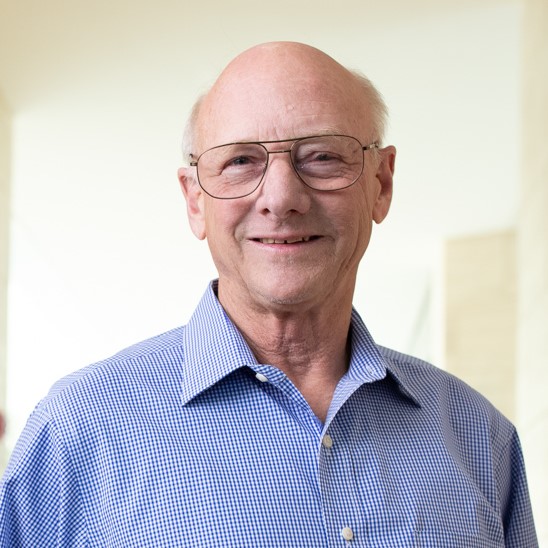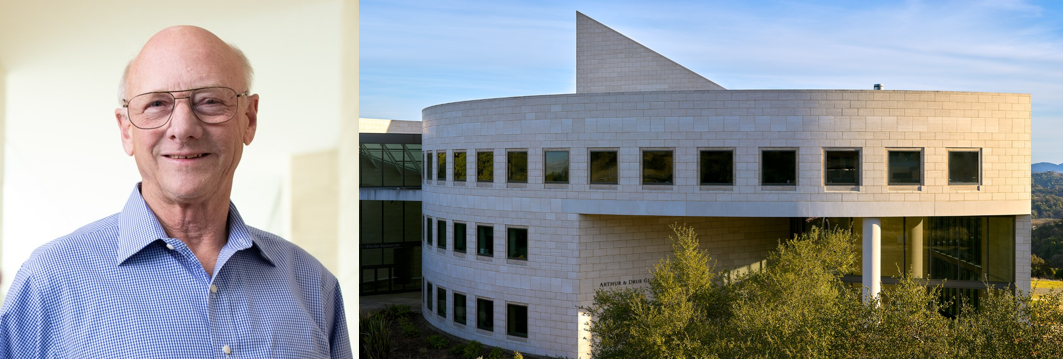by Buck Institute
August 8, 2023 . BLOG
Scientist Spotlight: Christopher Benz, MD
Founding faculty member brings a sense of exploration to his clinical practice, research agenda and personal life
 Christopher Benz, MD, one the Buck’s founding faculty members, is an adventurer, in both his scientific quests and his travels. Throughout his decades-long research career, he has sought new strategies to better diagnose and treat breast cancer. He also maintained an active clinical practice seeing oncology patients, all the while finding time for annual long hiking trips into the Sierra and traveling internationally to exotic locales.
Christopher Benz, MD, one the Buck’s founding faculty members, is an adventurer, in both his scientific quests and his travels. Throughout his decades-long research career, he has sought new strategies to better diagnose and treat breast cancer. He also maintained an active clinical practice seeing oncology patients, all the while finding time for annual long hiking trips into the Sierra and traveling internationally to exotic locales.
“Chris definitely explores directions that nobody else has,” says Senior Staff Scientist Gary Scott, PhD, who has been Benz’s partner in his research lab for most of his career. “Exploring” is an apt description of both his research career and approach to his entire life.
Benz and Scott grew up knowing each other in Southern California. Benz attended college at UCLA, where he earned a degree in biochemistry, then to the University of Michigan for medical school, which he completed while on a World Health Organization sponsored medical expedition in a remote region of Micronesia. After internship and medical residency at University of British Columbia, Vancouver, Benz undertook fellowship training and then joined the medical oncology faculty at Yale University, where he also met his wife-to-be, Connie, a New Englander who was also working in a cancer research lab.
In 1983 their young family moved to Novato, purchasing a home on the side of Mt. Burdell (close to the future site of the Buck Institute), as Chris was recruited to join Hematology/Oncology at UC San Francisco, grow a new basic research lab within the UCSF Cancer Research Institute and direct UCSF’s Hormone Receptor Laboratory.
Scott, who had earned a PhD in molecular biology, joined Benz at UCSF and they have worked and traveled together ever since. “We grew up together, and we have always been a good team,” says Scott. “It is tough to be a clinician and a researcher, but Chris has managed to keep his feet in both worlds.”
At UCSF, Benz treated all kinds of cancer patients, but found himself specializing as a breast oncologist due to his interest in cancers driven by hormones. “Seeing patients was rewarding, but I wanted to spend at least 75% of my time in my research lab,” he says. He wanted to discover better solutions for the problems that plagued his patients.
Taking a sabbatical year from UCSF in 1997-98 at both the Friedrich Miescher Institute and University of Basel in Switzerland transformed Benz’s career trajectory in an unexpected way, ultimately paving his way to the Buck Institute.
“The original reason I moved to the Buck Institute was actually not very scientific,” he says. Ironically, it had a lot to do with commuting: In Switzerland, his commute to work was an 8-minute walk, and when he returned to the United States, he was not a fan of the daily slog from Novato to San Francisco. A move to Bethesda to run a new division at the National Cancer Institute was in the works. His family, however, had other ideas, with three kids not keen on moving again and a wife very much involved with the community.
The dilemma was resolved when a world class research institution materialized on Mt. Burdell, practically in his own back yard. “The CEO of the newly opened Buck Institute, Dale Bredesen, asked me if I considered cancer to be a disease of aging, and I said ‘absolutely,’” Benz recalls.
The impact of aging on cancer development was not being studied, Benz says, because there wasn’t an interdisciplinary framework from which to approach it. The Buck’s multi-pronged approach to studying aging appealed to him. “I found it very stimulating to come to the Buck Institute,” he says, arriving (with Scott) in 2000. Since 2015, Benz has been the Elizabeth M. A. Stevens Professor of Cancer and Developmental Therapeutics, the Buck’s first named professorship.
A hot topic in the news in the early 2000s was the epidemic of breast cancer in Marin County, which had one of the world’s highest per capita incidence of one particularly common form of the disease. It turned out to lead Benz on a series of explorations to explain differences in breast cancer rates. It began when Benz helped form the Marin Women’s Study (MWS), a community based effort launched in 2006 under the leadership of the Marin County Health Department.
This groundbreaking MWS, which surveyed more than 13,000 Marin women over the next 8 years, led to a number of findings, establishing linkages between breast cancer and hormone replacement therapy, delayed childbirth, obesity and Vitamin D. Among these findings, the Benz lab discovered that women inheriting a common variant of a growth factor receptor gene associated with aging (IGF1R) who also had a history of high blood pressure during pregnancy developed less dense breast tissue, a key factor associated with lower breast cancer risk.
That MWS finding gave Benz and his team their first inkling about the importance of inheriting seemingly “normal” variants in genes known to be associated with aging, and how these inherited variants might determine why some women get breast cancer while others don’t. While that first study was too small to be conclusive, it served as the launching pad for “a very long series of population-based studies”,” as Benz describes it, from 2014 to 2022. In short, their findings found significant protective benefits against developing breast and non-breast cancers as well as hypertension and cardiovascular disease.
“Chris has an uncanny sense to dig around in areas others haven’t thought of,” says Scott. “He loves to argue, is energized by debating and seems to care about everything.”
After Benz’s own wife was diagnosed and treated for breast cancer, it changed his perspective, both solidifying his professional resolve to outsmart the disease and to keep his and his wife’s personal lives open to new experiences. Their recent travels include such exotic locales as the northern fjords and polar landscapes of Norway, as well as the remote wilds of Borneo for wildlife photography.
Meanwhile, after working more than 40 years, Benz shows few signs of slowing down. “I'm the oldest faculty member at the Buck,” he says. “I'm well beyond retirement age, but I enjoy my research and collaborating with other Buck scientists too much to retire quite yet.”

SHARE